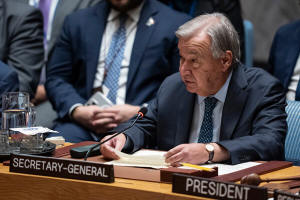25 years after landmark UN resolution, UN chief says women are too often
absent from peace talks
[October 07, 2025]
By EDITH M. LEDERER
UNITED NATIONS (AP) — Twenty-five years after a landmark U.N. resolution
demanded equal participation for women in all efforts to promote peace,
the United Nations chief said Tuesday that far too often women remain
absent.
At the same time, sexual violence against women and girls is on the rise
and 676 million women live within 50 kilometers (30 miles) of deadly
conflicts, which the head of the U.N. women's agency says is the highest
number since the 1990s.
“Around the globe, we see troubling trends in military spending, more
armed conflicts, and more shocking brutality against women and girls,"
Secretary-General Antonio Guterres told a U.N. Security Council meeting
marking the anniversary.
Since the resolution’s adoption on Oct. 31, 2000, there has been some
progress, he said. The number of women in uniform as U.N. peacekeepers
has doubled, women have led local mediation, advanced justice for
survivors of gender-based violence, and women’s organizations have been
instrumental in promoting recovery from conflicts and reconciliation.
“But gains are fragile and – very worryingly – going in reverse,”
Guterres said.

In no-nonsense language, Guterres said too often nations gather in rooms
like the Security Council chamber “full of conviction and commitment,”
but fall far short of the resolution’s demand for equal participation of
women in peace negotiations — and protection of women and girls from
rape and sexual abuse in conflicts.
Despite the horrors of war, UN Women Executive Director Sima Bahous also
pointed to some progress. She said women have reduced community violence
in the disputed Abyei region between Sudan and South Sudan and in the
Central African Republic.
[to top of second column]
|

United Nations Secretary-General Antonio Guterres speaks during a
Security Council meeting at the United Nations headquarters,
Tuesday, Sept. 23, 2025, at U.N. headquarters. (AP Photo/Yuki
Iwamura)

In Haiti, women have achieved near parity in the new provisional
electoral council, and women’s representation in Chad’s National
Assembly has doubled, she said. Syria’s interim constitution
guarantees rights and protections for women, and in war-torn Ukraine
women have succeeded in getting national relief efforts helping
women codified into law.
But Bahous also said it's lamentable that the world today is
witnessing "renewed pushback against gender equality and
multilateralism.” She said the situation is being exacerbated by
what she called short-sighted funding cuts.
These cuts are undermining education opportunities for Afghan girls,
curtailing life-saving medical care for tens of thousands of sexual
violence survivors in Sudan, Haiti and beyond, and limiting access
to food for malnourished women and children in Gaza, Mali, Somalia
and elsewhere, Bahous said.
She stressed that change is possible.
“It is understandable that some might conclude that the rise and
normalization of misogyny currently poisoning our politics and
fueling conflict is unstoppable,” Bahous said. “It is not. Those who
oppose equality do not own the future, we do.”
Guterres urged the U.N.’s 193 member nations to increase their
commitment to women caught in conflict with new funding and by
ensuring their participation in peace negotiations, accountability
for sexual violence and their protection and economic security.
All contents © copyright 2025 Associated Press. All rights reserved |